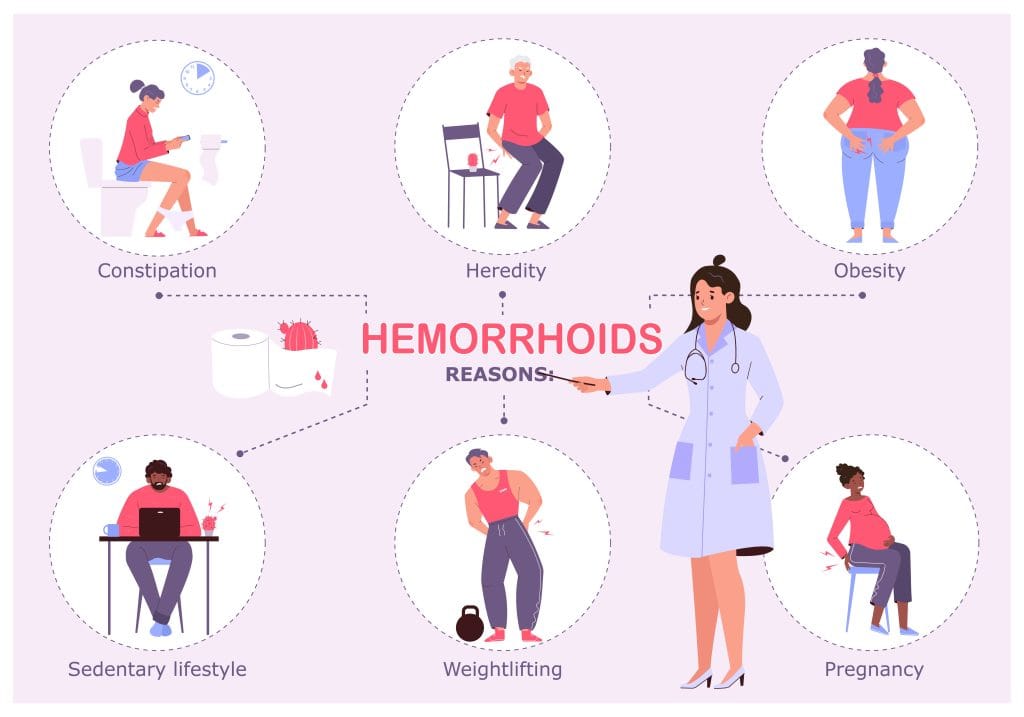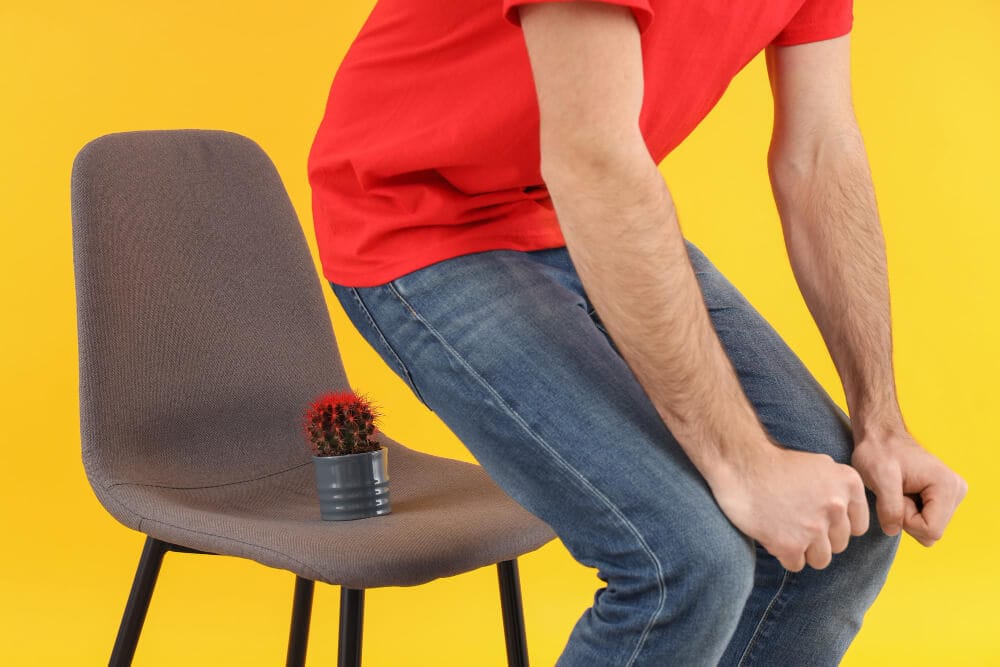During the holy month of Ramadan, you may encounter unexpected health issues, including uncomfortable itching. This symptom can be perplexing; is it a sign of hemorrhoids, or could it indicate something more concerning? So, you need to address itching during Ramadan before it aggregates.
Understanding the root cause is crucial for effective treatment and relief. In this post, we delve into the potential reasons behind itching during Ramadan, offering insights on diagnosis and providing practical advice for alleviating discomfort.
By addressing this sensitive topic head-on, you’ll find strategies to maintain your well-being while observing your fast.
Itching During Ramadan: Causes And Solutions
- Itching during Ramadan can be a sign of hemorrhoids, but it’s crucial to differentiate it from other causes by recognizing specific symptoms such as swelling, discomfort, and bleeding during bowel movements.
- Seeking medical assistance is important to accurately diagnose the cause of itching and to receive appropriate treatment, ensuring that any fasting or dietary practices during Ramadan do not exacerbate the condition.
- Home remedies, including warm baths, over-the-counter creams, and increasing fiber intake, can provide temporary relief from itching and discomfort associated with hemorrhoids.
- Implementing lifestyle changes, such as staying hydrated, avoiding prolonged sitting, and incorporating regular exercise, can help prevent the recurrence of hemorrhoids and improve overall digestive health.
- In severe cases, surgical procedures may be necessary to remove hemorrhoids, and understanding the recovery process is essential for managing expectations and facilitating healing.
- Recognizing the signs of hemorrhoids and taking proactive steps toward diagnosis, treatment, and prevention can help individuals maintain comfort and health during Ramadan and beyond.

Understanding Itching During Ramadan
Dehydration Effects
Dehydration is a common issue during Ramadan. You might not drink enough water between Iftar and Suhoor. This lack of hydration affects your skin’s health, making it dry and itchy.
To combat dehydration, try to drink plenty of water after sunset and before dawn. Aim for 8-10 glasses. Eating hydrating foods like fruits and vegetables can also help.
Diet Changes
Your diet changes significantly during Ramadan. These changes can lead to constipation or diarrhea, affecting bowel movements. Both conditions might cause or worsen itching in the rectal area. To maintain healthy bowel movements:
- Include fiber-rich foods in your meals.
- Avoid overeating at Iftar.
- Limit sugary and processed foods.
These steps can help prevent discomfort caused by hemorrhoids or other digestive issues.
Stress and Sleep
Ramadan can be a stressful time due to altered sleep patterns and daily routines. Stress and lack of sleep might make you more prone to itching, as they weaken the body’s natural defenses against irritation. For better stress management:
- Try relaxation techniques such as meditation.
- Ensure you get enough rest even if your sleep schedule shifts during this month.
Differentiating Hemorrhoids from Other Causes of Itching
Bleeding Signs
Hemorrhoids often lead to bleeding during bowel movements. This is not common with other types of itching. If you notice blood, it’s a strong sign.
Bleeding can scare you. But remember, it helps identify hemorrhoids early. Always check after wiping.
Swollen Veins
Look for swollen veins around the anus. They are a clear indicator of hemorrhoids. These swollen areas may feel tender or painful.
Swelling is easier to spot than internal issues. You might see or feel lumps near your anus area.
Persistent Itching
Persistent itching without an external cause could mean internal hemorrhoids. This type of itch doesn’t go away easily and needs attention.
Internal issues are tricky since you can’t see them directly. But if the itch lasts long, consider it a warning sign.
Recognizing Symptoms of Hemorrhoids
Discomfort Sitting
If you find sitting uncomfortable or experiencing pain, it might be a sign. Hemorrhoids can make everyday activities challenging. This discomfort is due to swollen veins in the anal area.
Large hemorrhoids contribute significantly to this discomfort. They result from strained bowel movements or constipation, aggravating the situation.
Blood Detection
Noticing blood on toilet paper after wiping is alarming. It’s often one of the first signs people notice. This bleeding comes from damaged hemorrhoidal tissue during bowel movements.
Rectal bleeding should not be ignored. While it commonly indicates hemorrhoids, other serious conditions can also cause it.
Lump Presence
Feeling lumps near your anus suggests swollen rectal veins. These lumps are external hemorrhoids that have formed outside the anal canal.
They may cause severe pain if they become too large or inflamed. Early detection and treatment can prevent complications.

Home Remedies for Itching Relief During Ramadan
Hemorrhoid Creams
After seeking medical advice, you might consider home treatments. Over-the-counter hemorrhoid creams or suppositories can offer quick relief. They reduce inflammation and soothe the itching sensation.
Apply these products as directed on their packaging. Be gentle to avoid further irritation. Remember, not all products work the same for everyone.
Sitz Bath
A sitz bath is another effective method to soothe your anal area with warm water. This process involves sitting in a shallow bath that covers only your hips and buttocks.
Fill a tub with warm water and sit for 15-20 minutes after bowel movements. This can significantly reduce discomfort and promote healing.
Increase Fiber Intake
To ease bowel movements, increasing your fiber intake is crucial. Hard stools can aggravate symptoms by causing strain during bowel movements. Incorporate high-fiber foods into your diet:
- Fruits
- Vegetables
- Whole grains
Consider a fiber supplement if needed, but consult with a healthcare provider first.
Lifestyle Changes to Prevent Recurring Hemorrhoids
Stay Hydrated
Drinking enough water is crucial. It keeps your stool soft, preventing constipation and straining. Aim for eight glasses a day.
This simple step helps reduce the risk of hemorrhoids significantly. Remember, less straining means less pressure on your anal veins.
Regular Exercise
Incorporate exercise into your routine. It promotes bowel movements and reduces pressure on veins in your lower body.
Start with light activities like walking or swimming. Avoid heavy lifting as it can worsen symptoms.
Avoid Long Periods
Sitting or standing for too long increases pressure on anal veins. Try not to stay in one position for more than an hour.
Take short breaks to walk around if your job requires long periods of sitting or standing. This will help relieve pressure and prevent hemorrhoids from forming or worsening.
Remember, these adjustments complement home remedies previously discussed for itching relief during Ramadan but focus more on prevention rather than treatment alone.

Seeking Medical Assistance for Itching During Ramadan
Consult Doctor
If home remedies fail to ease your itch, it’s time to see a doctor. Many people try over-the-counter creams or natural solutions first. However, persistent itching requires professional care.
Your healthcare provider can offer specific medications. These might target the underlying cause of your discomfort more effectively than home treatments. Remember, expert advice is crucial when self-care doesn’t work.
Notice Bleeding
Rectal bleeding is a serious sign that shouldn’t be ignored. If you spot blood during bathroom visits, contact a doctor immediately. This symptom could indicate hemorrhoids or another condition needing urgent attention.
Bleeding combined with itching demands quick action. A healthcare provider will diagnose the problem accurately and suggest appropriate treatment options.
Fasting Concerns
Discuss any fasting concerns with your healthcare provider if you suspect hemorrhoids are causing the itch. They understand the importance of Ramadan and can guide safe fasting practices alongside treatment.
Adjustments in diet or medications may be recommended to manage symptoms without breaking your fast. Your doctor’s advice ensures you observe Ramadan comfortably while receiving necessary care for hemorrhoids or other conditions causing anal itching.
Final Note From Dr. Rajarshi Mitra
Experiencing itching during Ramadan can be a distressing symptom, but understanding whether it’s due to hemorrhoids or another condition is crucial for effective treatment. You’ve learned how to differentiate hemorrhoids from other causes, recognize their symptoms, and the importance of seeking medical assistance.
Home remedies and lifestyle changes play significant roles in relief and prevention, while surgical options are available for severe cases. Remember, managing recovery after surgery is key to healing and preventing recurrence.
Take action by monitoring your symptoms closely and consulting healthcare professionals if you suspect hemorrhoids or any other health issue. Your well-being is paramount, especially during the fasting period of Ramadan.
Don’t let discomfort or uncertainty deter you from seeking help. Prioritize your health to ensure a fulfilling and spiritually enriching Ramadan experience.
FAQs
Is itching during Ramadan a sign of hemorrhoids?
Itching during Ramadan can be a symptom of hemorrhoids, especially if accompanied by discomfort or bleeding. However, other conditions may also cause itching.
How can I differentiate between hemorrhoids and other causes of itching?
To differentiate, look for hemorrhoid symptoms like anal swelling or lumps. Other causes might not present these physical signs but could include skin irritation or infections.
Should I seek medical assistance for itching during Ramadan?
Yes, consulting a healthcare provider is advised to diagnose the cause accurately and receive appropriate treatment recommendations.
Are there home remedies that provide relief from anal itching during Ramadan?
Home remedies like warm sitz baths, applying over-the-counter creams specifically for hemorrhoid relief, and keeping the area clean can help alleviate symptoms.
What lifestyle changes can prevent recurring hemorrhoids?
Incorporating high-fiber foods into your diet, staying hydrated, and avoiding prolonged sitting or straining during bowel movements can prevent future occurrences.



















